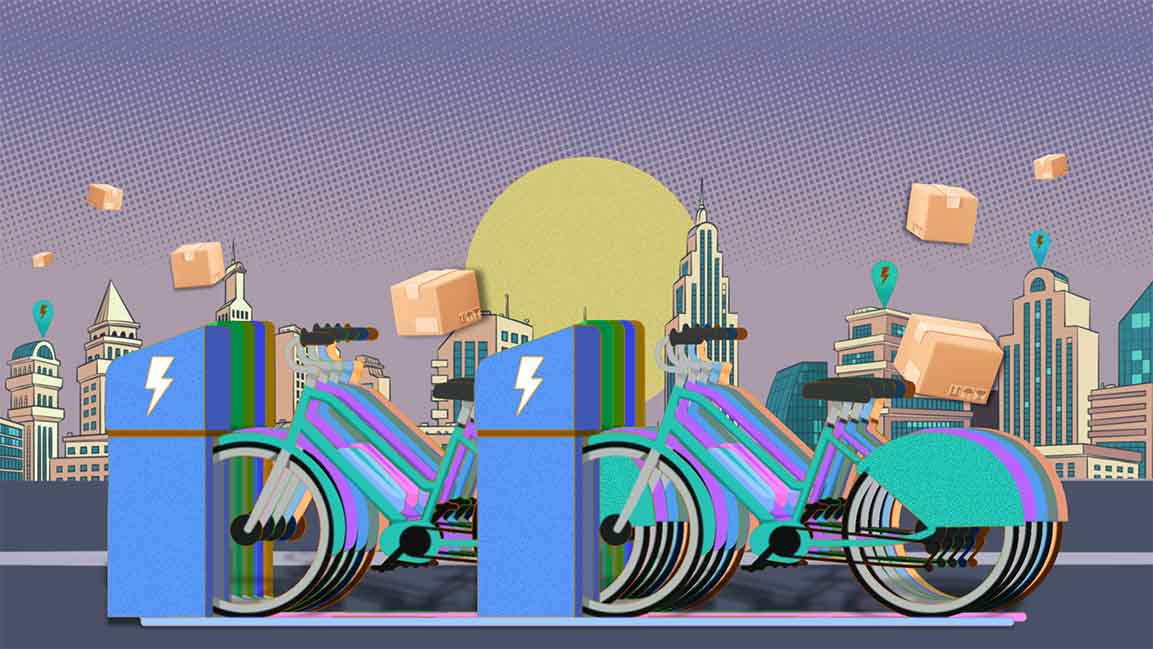- | 9:00 am
UAE’s last-mile delivery can become low carbon. This is the solution
After Dubai revealed plans to encourage delivery companies to switch to e-bikes, the idea is catching on

In the rush to get packages to your doorstep faster, delivery companies are experimenting with drones and robots that can circumvent traffic.
But how about your groceries, books, and medicines being delivered without a side order for carbon emissions? UAE is considering a zero-carbon emission option – e-bikes.
In December, Dubai’s Road and Transport Authority revealed plans to encourage delivery companies to switch to e-bikes by amending licensing and registration requirements.
And the idea of greener last-mile delivery is catching on.
“Retail, delivery, and logistic businesses are now looking for alternative emission-free transportation methods,” says Alexander Lemzakov, CEO and co-founder of Wize, a B2B platform providing for the last-mile market, including e-bikes. “There’s a growing interest in e-bikes; we are sure they will become mainstream this year.”
Several online food delivery services in the Gulf region are currently testing Wize’s solutions. “Around 200 Wize e-bikes will be used in Dubai for last-mile delivery in January and 1000 by the end of 2024,” adds Lemzakov.
Recently, EnerTech, a Kuwait-based innovator, investor and developer of sustainable solutions, has launched an end-to-end solution to decarbonize last-mile delivery with its solar-powered charging platform called CHRGR, e-bikes, and a mobile app that streamlines the process for drivers to locate charging cabinets and swap or reserve batteries to operate efficiently.
“We’re looking at 5,000 bikes in the next three years,” says Ammar Shihab, Head of Investments and Projects, EnerTech.
With demand for urban last-mile delivery projected to surge by 78% by 2030, Shihab adds, “The need for sustainable transport solutions is only going to get greater.”
Even Careem, the region’s multi-service platform, has launched its first fleet of e-bikes for delivery with charging infrastructure in December. Up to 1,000 electric e-bikes will be used by 2024.
“Our customers can have peace of mind that the items that they order on the Careem app are being delivered with a low carbon footprint,” said Mudassir Sheikha, CEO and Co-founder at Careem, during the launch.
This shift towards sustainable electric mobility aligns with the global consensus that emerged from COP28, which emphasized the need to “transition away from fossil fuels” and triple the adoption of renewable energy while doubling the global average annual rate of energy efficiency improvements by 2030.
“Urban logistics is experiencing burgeoning demand in a fast-paced city like Dubai,” says Shihab.
ADVANTAGES OF E-BIKES
“Improving air quality and reducing noise pollution are key environmental concerns that have risen in recent years with more delivery bikes on our roads,” adds Shihab.
E-bikes have a host of advantages. They can move more quickly through the city streets and deliver packages 60% faster than their van equivalents.
“By leveraging innovative technology, we can implement speed restrictions in specific city areas to prioritize pedestrian safety while maintaining efficient delivery speeds on major highways,” says Lemzakov.
They’re cleaner – saving about 90% in carbon emissions – quieter, and cut congestion, as a cargo bike uses a fraction of the road space of a typical delivery van.
With more than 75,000 bikes in UAE’s delivery fleet, Shihab says its e-mobility platform can remove about 18,000 tons of carbon emissions a year by the end of 2026 across the country’s last-mile delivery sector.
“Since online food delivery in the UAE has high demand, with an annual growth rate of 14%, the transition to e-bikes can greatly reduce carbon emissions,” adds Lemzakov.
Additionally, e-bikes are cost-effective, which is crucial for businesses focusing on bottom-line efficiency.
“E-bikes reduce transportation costs by up to 30% per month,” adds Lemzakov.
E-bikes for last-mile logistics are increasingly recognized as superior for last-mile mobility, says Shihab. “Their lower operating costs, due to reduced fuel and maintenance expenses, make them economically valuable.”
DEVELOPING INFRASTRUCTURE
These startups are now expanding in all directions.
Building on charging platforms at Dubai’s Museum of the Future and Masdar City, EnerTech aims to bring its innovative electric mobility solution across the UAE and expand into the broader region.
Wize is working on developing battery infrastructure across the city.
“E-bikes will be easier not only to move but also to maintain,” says Lemzakov.
Wize’s swapping stations are within warehouses and dark stores, enabling couriers to exchange batteries and pick up orders simultaneously. It is also installing a network of battery-swapping stations across the UAE that will allow drivers to quickly and easily exchange batteries for fully charged ones, significantly reducing downtime.
The batteries are built to withstand local weather conditions to ensure optimal performance in the region’s hot and arid climate, says Lemzakov.
“500 EV batteries are scheduled for delivery this month and 100 stations to be installed within the next three years,” he adds.
With strong interest from businesses and customers — companies want greener delivery options, and customers love having their food delivered by bike that doesn’t pollute the roads — we can hope for cleaner and quieter roads soon.
“Sustainable transport solutions are about creating healthier, more livable urban environments and ensuring the long-term success of local businesses in an increasingly eco-conscious world,” says Shihab.








































